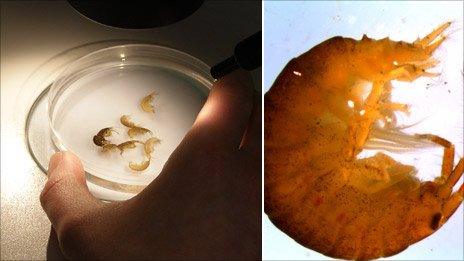Hunt widens for 'killer shrimp' in Wales
- Published

Measuring up to 30mm in length, the shrimp thrives on hard surfaces like boulders, rocks and gravel just below the water surface
Special traps baited with cat food are being used in a bid to establish the extent of the spread of a "killer shrimp" in south Wales.
The alien invader has so far been found at Cardiff Bay and Eglwys Nunydd reservoir in Port Talbot.
Biologists say it can have a devastating impact on native species and could even lead to extinctions.
The nets will be deployed at other "high priority sites" across Wales.
The Dikerogammarus villosus, external, originally from the region around the Black and Caspian seas, has spread across western Europe over the past 10 years via waterways such as the Danube and Rhine Canal.
The only other confirmed population in the UK is at the Grafham Water reservoir in Cambridgeshire.
It is not known how it got there or to the two sites in south Wales.
Measuring up to 30mm in length, it thrives on hard surfaces like boulders, rocks and gravel just below the water surface so such areas are being treated as priority for sampling in Wales.
It has earned its nickname because it sometimes kills its prey and leaves it uneaten.
The Welsh Assembly Government and the Department for the Environment, Food and Rural Affairs (Defra) have established a national task group to tackle the shrimp. It includes Environment Agency Wales and the Countryside Council for Wales.
Native invertebrates
Andrew Johnson of the Environment Agency said: "We know from research done in other parts of the world that the spread of the this fish can have a devastating effect on the ecology.
"We do not want to replicate this impact which is why the work we are doing with these traps is so important."
He said the shrimp could damage fisheries in Wales and if it were to spread lead to the demise of other native invertebrates such as mayflies.
As well as testing other sites in Wales, the task group is working on ways to contain the shrimp from spreading and investigating methods of dealing with it.
New research has been commissioned as it admits the "available knowledge is limited."
It is also urging anyone who uses waters where the shrimp are present - including boat owners and anglers - to take steps to prevent the species from spreading., external
Mr Johnson said: "It's important any water user, whether it's a boat user, kayaker or angler, makes sure that they inspect their equipment when they take it out of the water, that they wash it down and make sure its dry before it's taken into another water body."
- Published29 November 2010
- Published9 September 2010